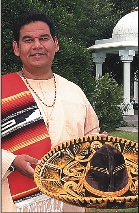BY JOHN CAMPOS
A few years ago, an Indian woman dressed in a sari approached me at a gas station in Austin, Texas. She asked if I knew directions to a local Hindu temple. It so happens I did, because I regularly attend services at that very temple. At the conclusion of our conversation, the lady asked what part of India I was from. I replied that I was from Mexico, not India. She looked at me with astonishment. “That’s amazing, ” she exclaimed. “A Mexican Hindu! I’ve never heard of such a thing!”
That wasn’t the first time this has happened to me. I have often been asked if I was born in India. The question amuses me, because I could respond both “yes ” and “no.” Since this would just confuse people, I usually just say, “No.” At times, however, I want to respond differently. Undoubtedly, I was born an Indian from a spiritual point of view. I formally adopted the Hindu faith several years ago.
Although my background makes my interest in Hinduism an intriguing story, it is not uncommon for non-Indians to become practicing Hindus. Many, like me, have recognized the spiritual wealth of Hinduism and benefited from its treasures. Its practice of bhakti (devotion), its Sanskrit scriptures, its philosophy of living and its yoga practices for the well-being of body and mind are but a few of its priceless spiritual jewels. Non-Indians who adopt Hinduism become spiritually enriched.
However, a troubling phenomenon is emerging, and it is growing. Indians who are Hindus by birth are discarding their religion. I believe that, in the process, they are becoming spiritually bankrupt.
Many Indians coming to the United States share common stories. Educated and ambitious, they are lured here by the promise of material acquisition. But along the way to this material wealth, many forget their birthright, their great spiritual ancestry of Hinduism.
This forsaking of their heritage for the sake of wealth brings to mind a Spanish dicho (saying) which goes like this: “Quien mucho abarca poco aprieta.” This means, “He who grasps much can hold on to little.” Certainly it is true that if life is lived for material benefits only, it is nearly impossible to hold on to God’s love. This love of God makes it possible to dwell in the contentment of the soul.
When I’m asked why I chose to practice Hinduism, my answer is founded on my practical experience of the spiritual happiness that it has brought me. My past religious studies were fruitless, because they did not inspire spiritual desire in me. By contrast, I found that the wisdom of Hindu scriptures was a deep well from which I could easily replenish my spiritual needs. This discovery was profound. I was searching for personal meaning in life and found it in Hinduism. There is such great solace in this ancient religion’s lucid philosophy and teachings of love for a personal God.
In the past I have also read the works of some Western philosophers. It seemed to me that what they said was just dry, intellectual speculation. By contrast, the deep love for and devotion to God that manifested in the lives of the great saints of the Hindu tradition were far more appealing to me. Their promise that, through loving devotion, it is possible to see, know and merge in divine communion with a personal form of God inspired my faith. I learned from Hinduism that by one’s sincere effort and God’s grace, God’s love will fructify in the heart. I also learned that it did not matter what my race, gender or belief was. This is how a Mexican came to be spiritually born an Indian.
